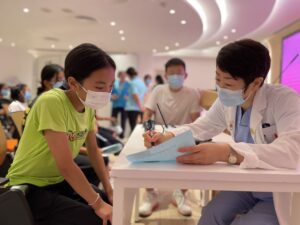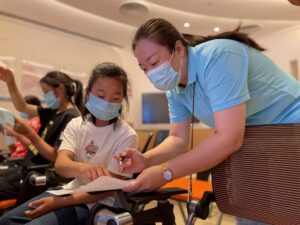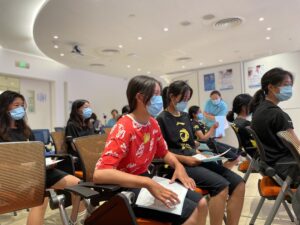Charity HPV Vaccination and Education
On June 25, 2023, United Foundation for China’s Health (UFCH) organized a second cohort of 51 needy women from different charity institutions to receive free HPV bivalent vaccine at United Family Women’s & Children’s Hospital. Dr. Zhang Yu, a special expert in Obstetrics and Gynecology at United Family Healthcare, conducted the medical consulting work for this event. As one of the donors of HPV program, staff from Woodside Energy’s Beijing office were also invited as a volunteer to support on site.
For the first time, we included a large group of teenagers in the program. Even though these teens watched HPV education videos on site, they are still learning about HPV. Such as what does it have to do with myself? Our goal is to help these children have a better understanding.
Get to know HPV
1. What is HPV ?
2.What does HPV have to do with me?
3. Why do we get HPV?
HPV is generally transmitted through unprotected sex (sex without a condom). Consistent and correct condom use can significantly reduce the risk of infection, but it does not guarantee 100% protection from infection.
4. What should I do if I have HPV?
First, after the infection of HPV do not be too nervous, as mentioned above, HPV is a big family, among which there are some types are not so harmful. Often within a year after infection, your body will rely on its own immunity to eliminate the virus from the body.
If you are infected with high-risk HPV and the virus persists in your body for more than a year, regular follow ups with your doctor is very important.
How can we protect ourselves?
- Annual Health Check-up with Pap Smear.
- Use Condoms every time you have sex.
- Keep up your immunity – be healthy.
- If you smoke, quit.
- Get the HPV Vaccination.
- If you have unusual pain or bleeding, see a doctor immediately.
In the future, UFCH will continue to provide more women with HPV prevention and education to help them avoid cervical cancer. Thanks again to Woodside Energy and Cushman & Wakefield for donating and supporting UFCH’s women’s health program!



